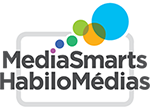Information Journeys
Start by asking students:
Can you think of a time when you went looking for information?
- For example, if you wanted to learn how to do something, if you wanted to learn more about something, or you were doing research for a school project.
Can you think of a time when information came to you?
- For example, if somebody told you about something that had happened, if you heard about a news story or if you saw a video online without looking for it.
- With younger students, you may want to review the word information before you begin the discussion. Make sure they are considering as broad a definition as possible: information could be anything from the current weather, to a recipe for cookies, to a news story or the history of Canada.
Have students share a few responses, to help them understand the difference between the two contexts and to make sure they have some examples of each to consider.
Now ask:
What, if anything, did you do to make sure the information was true?
Did you do (or would you do) different things when looking for information compared to when information comes to you?
Information is anything you can learn - from the current weather, to a recipe for cookies, to a news story or the history of Canada.
